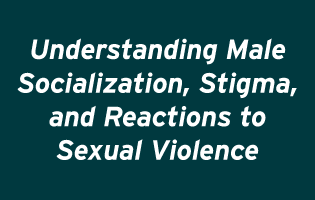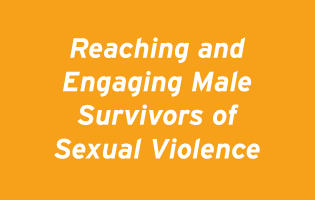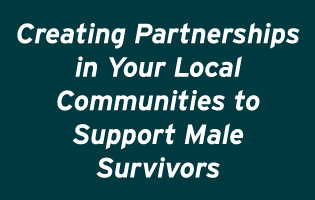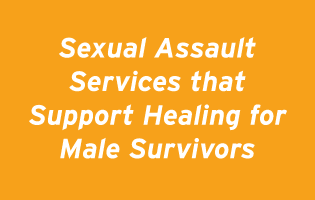
Offering services that provide healing for our clients is one of the core functions of a sexual assault center. Maybe you’re seeking to provide services that are more relevant to the needs and experiences of male survivors, or maybe you’re noticing that not a lot of men are using the services your center provides. As an advocate, you already have a lot of tools at your disposal based on your training and experience. At the same time, it’s not necessarily the case that all of those tools will translate into effectively serving male survivors.
One participant in our 2018 roundtable offered the example of using the experience of being nonjudgmental in working with male survivors. You already have a lot of experience approaching survivors in a nonjudgmental manner, so that’s something to build on. However, knowing that trauma expressions may look different for men may be something new for you.
Some of your existing services may work for male survivors in your community. Some of them may need small changes or adjustments to become relevant to male survivors, and some may need small changes in the way you’re marketing them in the community. And maybe some male survivors will benefit from your center offering new services that better fit their needs.
Centers should be clear with staff and volunteers that serving men is part of the mission – and that it isn’t extra work. There is often a misperception that having men inside of a sexual assault center creates an unsafe space for staff and clients, especially as many advocates have heard so many stories from victims and survivors of violence perpetrated by men. It is important to remind advocates that survivors who are men deserve the space and healing services that the center has to offer and that people of all genders can access the services whenever they are needed.
Similar concerns may come up around hotlines. Men may call the hotline for questions and ask one question, hang up, and then call back later, and may do this for a while before asking about services. Many men may either share a lot of info with very explicit detail or share nothing at all. It’s important for advocates and volunteers working on hotlines to be aware of these dynamics so they don’t misinterpret calls from male survivors as pranks, or somehow less serious, or even as violent.
These possible hotline reactions may be a result of vicarious trauma. Advocates and volunteers involved in the movement to end sexual violence have likely seen the impact of violence that has been perpetrated by many men, and may have personally experienced that type of violence themselves. Centers can offer ways for advocates to address this and other forms of vicarious trauma, and that healing work can have a significant impact on ability to work with male survivors. Centers can also offer training for staff on how to work with male survivors, specifically on how to support men from marginalized communities.
Assessing Our Capacity for Serving Male Survivors of Sexual Violence – Assessment tool
Sexual assault advocates and rape crisis centers can use this self-assessment tool to reflect on your current work serving men who have had unwanted sexual experiences. The tool offers reflection questions related to individual and organizational capacity to serve male survivors.
Lessons on Serving Male Survivors Through Sexual Assault Services Program – Print publication
A resource containing lessons learned from sexual assault services programs with comparatively high percentages of male survivors served with that funding stream. An accompanying blog series highlights in more depth what programs told us about their work: see blog one, blog two, and blog three.
Working with Male Survivors: Accessing Support After Incarceration – Podcast
Tonjie Reese, Senior Program Officer at Just Detention International, talks about working with male survivors who are formerly incarcerated. JDI supports survivors who are incarcerated and advocates who work with survivors who are incarcerated, and there are lots of opportunities for advocates to support survivors as they reenter the community.
Working with Male Survivors: Economic Barriers Behind Bars – Podcast
Tonjie Reese, Senior Program Officer at Just Detention International, talks about working with male survivors who are incarcerated. Tonjie highlights economic barriers and racial justice issues, and shares tips for advocates on hotline services, reaching survivors through inmate education efforts, and more.
Working with Male Survivors: Healing at Sexual Assault Centers and Beyond – Podcast
Sharon Imperato, Project Director of Clinical Training and Technical Assistance at the Boston Area Rape Crisis Center, and Jim Struve, executive director of MenHealing, talk about working with male survivors of sexual assault. They share their history of collaboration, approaches to working with male survivors, and sexual assault center services that support men in healing from sexual trauma.
Working with Male Survivors: How Sexual Assault Impacts Transgender Men – Part 2 – Podcast
michael munson, executive director of FORGE, talks about working with transgender men and transmasculine survivors. In this second part of a two-part conversation, michael talks about sexual assault services advocates can provide when working with trans men and transmasculine survivors.
Working with Male Survivors: Talking to Men with Disabilities About Sexual Assault – Podcast
Leigh Ann Davis, director of criminal justice initiatives at The Arc of the United States, and James Meadours, is a board member on Texas Advocates and a national advocate for healing from sexual assault and the rights of people with intellectual disabilities, talk about working with male survivors of sexual assault who have disabilities.
Working with Male Survivors: Successful Counseling Approaches for Your Incarcerated Clients – Podcast
Vanessa Sapien, Mental Health Program Director at Just Detention International, talks about working with male survivors who are in detention facilities.
Working with Male Survivors: Understanding Expressions of Trauma for Men – Podcast
Kenton Kirby, Director of Practice at the Center for Court Innovation, addresses how advocates at sexual assault centers can learn from his work to create safety for a young man who has been harmed to talk about that harm, some of the common ways men express trauma, and more.
Working with Male Survivors: Using an Empowerment Model in Detention – Podcast
Vanessa Sapien, Mental Health Program Director at Just Detention International, talks about using an empowerment model when working with male survivors in detention. An empowerment model of advocacy supports survivors in asserting their agency to make the choices that are best for them.
Working with Male Survivors: What Support Do Advocates Need? – Podcast
Emiliano Diaz de Leon joins us for a conversation on his experience training and supporting sexual assault advocates in Texas as they work with male survivors. He shares information on common needs advocates have expressed, how to start providing services to male survivors, and more. Emiliano is the Men’s Engagement Specialist at TAASA, the Texas Association Against Sexual Assault.
Beyond Survival: Skills for Healing – Videos
This YouTube playlist from MenHealing includes videos that help male survivors of sexual violence build skills for healing. Video topics include reframing trauma, trauma-informed yoga, and meditation.
Boys And Men Of Color Healing From Systemic And Interpersonal Trauma – Virtual roundtable
This 2020 virtual roundtable from Vera Institute of Justice is an intergenerational conversation on supporting the healing process of male survivors of color. It addresses racial and historical trauma, criminalization and hypersensitivity of Black and brown masculinity, and mass incarceration.
Healing of Boys and Men of Color Training Curricula – Curriculum
This curriculum supports victim service providers in understanding and implementing a holistic healing framework for boys and men of color. It includes three modules (Trauma 101, Historical Trauma, and Strengths-Based Policy Development) and corresponding training materials.
How Toxic Masculinity Hurts Male Survivors — and What Can Help – Blog
This 2019 blog by Sharon Imperato from Boston Area Rape Crisis Center addresses clinical aspects of “traditional masculinity ideology” and implications for working with male survivors of sexual violence.
Increasing Access to Healing Services and Just Outcomes for Older African American Crime Survivors: A Toolkit for Enhancing Critical Knowledge and Informing Action within the Crime Victim Assistance Field – Toolkit
This 2020 toolkit for victim service providers offers information and practical strategies to identify, reach, and serve older African American victims, including male survivors of sexual violence. The toolkit includes a guide with five content modules that have video clips, and a workbook.
Just Detention International Training Modules – Curriculum
These six training modules include topics like An Introduction to Sexual Abuse Behind Bars, the Prison Rape Elimination Act (PREA), and Supporting Incarcerated Survivors. Each module includes learning objectives, training materials like annotated slides with notes, and tips on using the guide.
MaleSurvivor Support Forum & Moderated Chat – Message board
These forums and chat are moderated by MaleSurvivor volunteers, and are available to male survivors of sexual violence who create a free account. Forum topics include recovering from sexual trauma, gay/bi/trans survivor issues, military survivors, and more.
Male Survivors and Medical Accompaniment: Our Forgotten Victims – Webinar
This webinar is part of a course in the Pennsylvania Coalition Against Rape and National Sexual Violence Resource Center online learning campus. The webinar includes information for advocates on understanding and responding to needs male survivors may have related to forensic exams.
Opening the Door to Healing: Reaching and Serving Crime Victims Who Have a History of Incarceration – Print publication
This 2020 report from Vera Institute of Justice addresses the needs and barriers to service for victims who have previously been incarcerated. It suggests strategies for meeting the needs of these survivors.
Part of the Solution: Gender-Integrated Sexual Assault Support Groups – Webinar
This 2017 webinar by FORGE highlights information gathered from facilitators of sexual assault support groups that have included survivors of all genders. FORGE highlights that gender-integrated support groups have extended services to transgender, non-binary, and male survivors of sexual violence, and have been sources of healing for survivors of all genders.
Returning and Healing Toolkit – Report
This 2020 toolkit from the National Resource Center includes recommendations for sexual assault centers working with survivors coming home from incarceration, and curriculum on sexual trauma in the returning population and talking about sexual violence. The toolkit also includes tip sheets for reentry agencies, which sexual assault advocates could use in building partnerships.
Vulnerable and Underserved: Victim Advocacy for Incarcerated Male Survivors of Color – Webinar
This 2019 webinar from Just Detention International helps advocates increase their capacity for providing services to male survivors of color who are incarcerated, focusing on how identity and custody status impacts experiences and needs. It also includes information on how to use PREA standards in your advocacy.
Vulnerable and Underserved: Victim Advocacy for Incarcerated LGBTI Survivors – Webinar
This 2019 webinar from Just Detention International offers strategies for using PREA standards as a tool of advocacy for LGBTI survivors who are incarcerated, understanding the high incident of prior trauma among LGBTI survivors who are incarcerated, and evaluating program’s readiness to serve LGBTI survivors.
Vulnerable and Underserved: Victim Advocacy for Incarcerated Survivors of Sexual Abuse Perpetrated by Women – Webinar
This 2019 webinar from Just Detention International helps advocates understand the shame and stigma that male survivors who are incarcerated may experience if they survived abuse perpetrated by women. It also offers strategies for addressing the impact of this form of violence on survivors.
Weekend of Recovery – Retreats
This program by MenHealing is a three-day retreat with healing workshops for male survivors of sexual violence. The website also includes information on other MenHealing events like Advanced Weekends of Recovery, Days of Recovery, a sample agenda, and other events that support healing for male survivors. (Also see the blog What Happens at a Weekend of Recovery? written by a participant.)
Weekly Online Support Groups – Online chat
These free, anonymous chat-based support groups for male survivors of sexual violence is a program of 1in6. The groups are set up to provide support to men in trauma recovery, focusing on education and mutual support.
For more information please email resources@nsvrc.org
 |
 |
 |
 |
 |
 |
 |
 |
